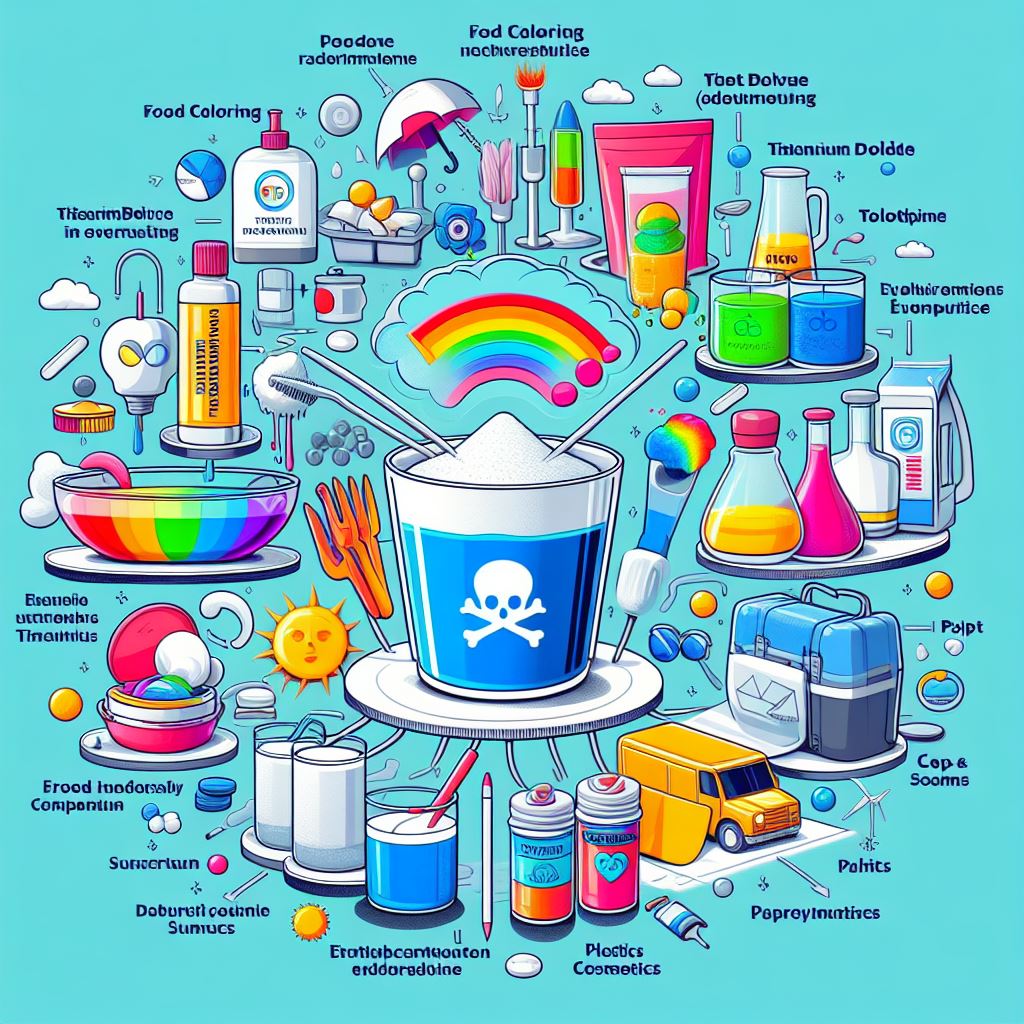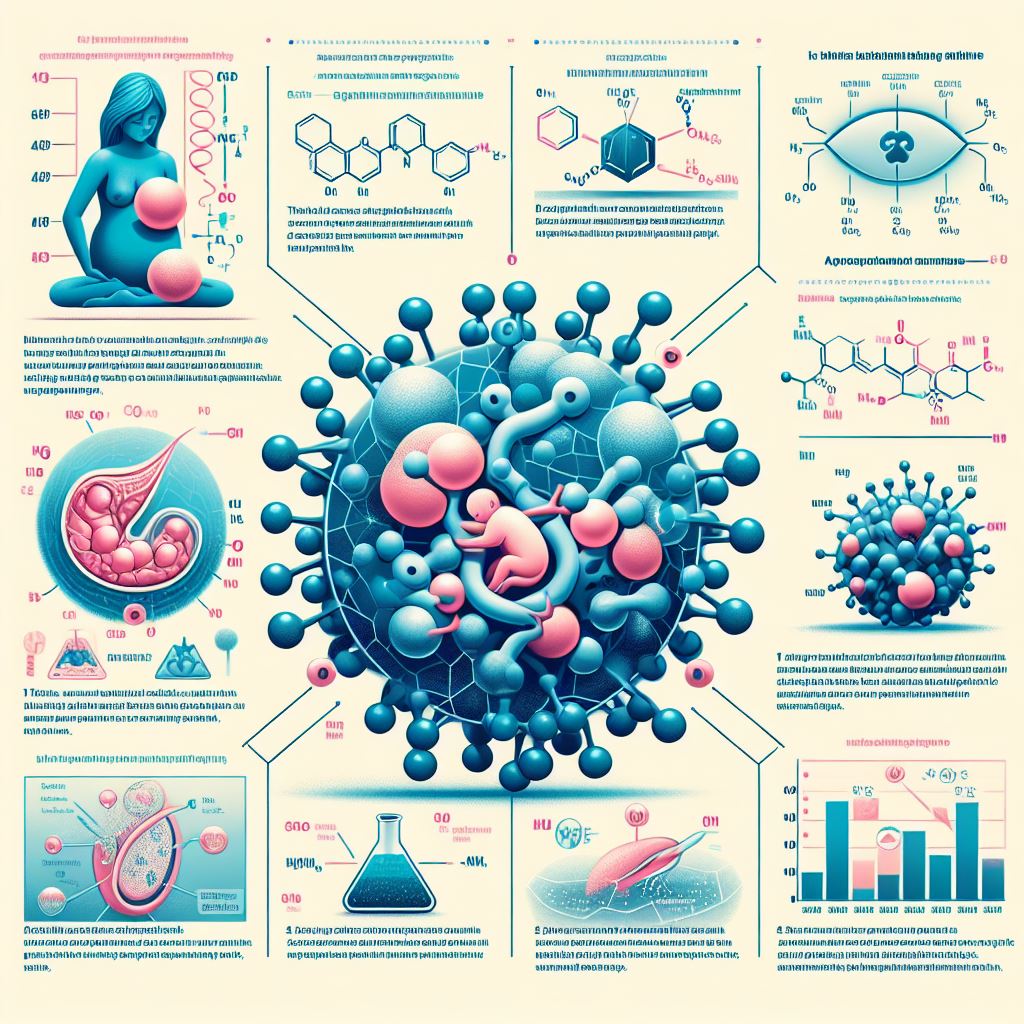Titanium dioxide is a widely used compound that is found in many everyday products. It is commonly used as a white pigment in cosmetics, food, and medications. However, there have been concerns about the potential risks of titanium dioxide, especially for pregnant women. In this article, we will explore what titanium dioxide is, its uses, and the safety considerations during pregnancy. We will also provide tips for minimizing exposure to titanium dioxide. Here are the key takeaways:
Key Takeaways
- Titanium dioxide is a white pigment commonly used in cosmetics, food, and medications.
- Exposure to titanium dioxide during pregnancy may have potential risks.
- It is important to read product labels and choose titanium dioxide-free products.
- Certain foods and medications may contain titanium dioxide and should be avoided if concerned about exposure.
- Consult with a healthcare professional for personalized advice on minimizing exposure to titanium dioxide during pregnancy.
What is Titanium Dioxide?
Properties of Titanium Dioxide
Titanium Dioxide is a naturally occurring mineral that is commonly used as a white pigment in various products. It has a high refractive index, which means it has excellent light-scattering properties. This makes it an ideal ingredient for providing opacity and brightness in products such as paints, coatings, and plastics.
In addition to its optical properties, Titanium Dioxide also has good chemical stability and resistance to UV radiation. This makes it suitable for use in sunscreens and other skincare products, where it helps to protect the skin from harmful UV rays.
Here are some key properties of Titanium Dioxide:
- High refractive index
- Excellent light-scattering properties
- Good chemical stability
- UV radiation resistance
Note: Titanium Dioxide is classified as a safe ingredient when used in approved concentrations in cosmetic and personal care products. However, its safety in other applications, such as food and medications, may vary.
Uses of Titanium Dioxide
Titanium Dioxide is widely used in various industries due to its unique properties. Some of the common uses of Titanium Dioxide include:
- Cosmetics and Personal Care Products: Titanium Dioxide is used in sunscreen, foundation, and other cosmetic products due to its ability to reflect and scatter UV radiation.
- Food and Food Packaging: Titanium Dioxide is used as a food additive to enhance the appearance of food products. It is commonly found in candies, chewing gum, and icing.
- Medications and Supplements: Titanium Dioxide is used as a coloring agent in medications and supplements to improve their visual appeal.
It is important to note that the use of Titanium Dioxide in these products is regulated by health authorities to ensure its safety for consumers.
Safety of Titanium Dioxide
Titanium Dioxide is generally considered safe for use in various products. It has been extensively studied and approved by regulatory agencies such as the FDA and the European Food Safety Authority. The safety of Titanium Dioxide is primarily attributed to its low toxicity and limited absorption into the body.
However, it is important to note that some studies have raised concerns about potential health risks associated with inhalation or ingestion of high concentrations of Titanium Dioxide nanoparticles. These studies suggest that long-term exposure to high levels of Titanium Dioxide nanoparticles may have adverse effects on the respiratory system.
To minimize any potential risks, it is recommended to follow product instructions and use Titanium Dioxide-containing products as directed. If you have any concerns or questions, it is advisable to consult with a healthcare professional.
Titanium Dioxide in Everyday Products

Cosmetics and Personal Care Products
Titanium dioxide is commonly found in cosmetics and personal care products such as foundation, powder, sunscreen, and lipstick. It is used as a pigment to provide whiteness and opacity to these products. Titanium dioxide is also used in lotions, creams, and moisturizers to provide UV protection.
In addition to its use as a pigment and UV protectant, titanium dioxide is also used as a thickening agent in some cosmetics and personal care products. It helps to give these products a smooth texture and creamy consistency.
When using cosmetics and personal care products that contain titanium dioxide, it is important to note that the concentration of titanium dioxide may vary. Some products may contain higher levels of titanium dioxide than others, so it is important to read product labels and choose products that align with your personal preferences and concerns.
Food and Food Packaging
Titanium dioxide is commonly used in the food industry as a food additive. It is added to a variety of food products to enhance their appearance and give them a bright white color. Some examples of food products that may contain titanium dioxide include candies, chewing gum, icing, and powdered sugar.
While titanium dioxide is considered safe for consumption in small amounts, there are concerns about its potential effects on health when consumed in larger quantities. Studies have shown that high levels of titanium dioxide intake may lead to inflammation and damage to the intestinal lining.
To minimize exposure to titanium dioxide in food and food packaging, it is recommended to:
- Read product labels carefully and look for titanium dioxide as an ingredient.
- Choose products that are labeled as titanium dioxide-free.
- Limit consumption of heavily processed foods that are more likely to contain titanium dioxide.
It is important to note that more research is needed to fully understand the potential risks of titanium dioxide in food and its impact on pregnancy. If you have any concerns, it is best to consult with your healthcare provider.
Medications and Supplements
When it comes to medications and supplements, it’s important to be aware of the potential presence of titanium dioxide. Titanium dioxide is commonly used as a coloring agent in various medications and supplements. While it is generally considered safe for consumption, some studies have raised concerns about its potential effects on health.
One study found that titanium dioxide nanoparticles can cross the placental barrier and accumulate in the fetal liver, potentially affecting fetal development. However, more research is needed to fully understand the implications of this.
If you’re concerned about your exposure to titanium dioxide during pregnancy, here are a few tips:
- Consult your healthcare provider: Discuss any concerns you have about medications and supplements containing titanium dioxide with your healthcare provider. They can provide guidance and recommend alternative options if necessary.
- Read product labels: Look for medications and supplements that are labeled as titanium dioxide-free.
- Consider natural alternatives: Explore natural alternatives to medications and supplements that may contain titanium dioxide.
It’s important to remember that every pregnancy is different, and what works for one person may not work for another. If you have any concerns about titanium dioxide or any other substances during pregnancy, it’s best to consult with your healthcare provider for personalized advice.
Potential Risks of Titanium Dioxide in Pregnancy

Exposure to Titanium Dioxide during Pregnancy
During pregnancy, it is important to be mindful of your exposure to titanium dioxide. This compound is commonly found in various everyday products, including cosmetics, food, and medications. While the safety of titanium dioxide is still being studied, it is recommended to take precautions to minimize exposure.
One way to reduce exposure is by reading product labels. Look for products that are labeled as titanium dioxide-free or contain lower levels of the compound. Additionally, consider choosing alternative products that do not contain titanium dioxide.
It is also important to be aware of the foods and medications you consume. Some foods and medications may contain titanium dioxide as an additive. Consult with your healthcare provider to determine if any adjustments need to be made to your diet or medication regimen.
Remember, the goal is to minimize exposure to titanium dioxide during pregnancy to ensure the health and well-being of both you and your baby.
Effects on Fetal Development
Exposure to titanium dioxide during pregnancy has been found to have potential effects on fetal development. Studies have shown that exposure to high levels of titanium dioxide nanoparticles can cross the placenta and reach the developing fetus. This can lead to oxidative stress and inflammation in the fetal tissues, which may disrupt normal development.
Additionally, some research suggests that titanium dioxide nanoparticles may have endocrine-disrupting effects on the fetus. These effects can interfere with the normal functioning of hormones, which play a crucial role in fetal growth and development.
To minimize the potential risks, pregnant women need to be aware of the products they use and their titanium dioxide content. Reading product labels and choosing titanium dioxide-free products can help reduce exposure. It is also advisable to avoid certain foods and medications that may contain titanium dioxide.
Tips for minimizing exposure to titanium dioxide during pregnancy:
- Read product labels carefully and look for titanium dioxide-free alternatives.
- Choose natural and organic cosmetics and personal care products.
- Opt for fresh and minimally processed foods that are less likely to contain titanium dioxide.
- Consult with a healthcare professional before taking any medications or supplements that may contain titanium dioxide.
Pregnant women need to prioritize their health and take necessary precautions to minimize exposure to potentially harmful substances like titanium dioxide.
Possible Health Risks for Pregnant Women
During pregnancy, exposure to titanium dioxide may pose potential health risks for pregnant women. While research on the specific effects of titanium dioxide on pregnant women is limited, it is important to be cautious due to its potential to cross the placenta and affect fetal development.
Some potential health risks for pregnant women include:
- Respiratory issues: Inhalation of titanium dioxide particles may cause respiratory irritation and exacerbate existing respiratory conditions.
- Skin irritation: Direct contact with titanium dioxide may cause skin irritation, especially for individuals with sensitive skin.
- Allergic reactions: Some individuals may be allergic to titanium dioxide, and exposure during pregnancy could trigger allergic reactions.
Pregnant women should minimize their exposure to titanium dioxide by reading product labels, choosing titanium dioxide-free products, and avoiding certain foods and medications that may contain this ingredient.
Tips for Minimizing Exposure to Titanium Dioxide

Reading Product Labels
When reading product labels, it is important to look for titanium dioxide listed as an ingredient. This information can usually be found in the ingredient list on the packaging. Additionally, keep an eye out for any other names that titanium dioxide may be listed as, such as CI 77891 or TiO2. These alternative names are commonly used in cosmetic and personal care products.
To make it easier to identify products that contain titanium dioxide, consider creating a list of brands or products that you trust and that are titanium dioxide-free. This can help you quickly determine which products to avoid. You can also look for products that are labeled as titanium dioxide-free or free of nanoparticles if you are concerned about potential risks.
If you are unsure about a product or its ingredients, don’t hesitate to reach out to the manufacturer for more information. They should be able to provide you with details about the presence of titanium dioxide and any potential risks associated with its use during pregnancy.
Choosing Titanium Dioxide-Free Products
When looking for titanium dioxide-free products, it’s important to carefully read product labels. Look for keywords such as ‘titanium dioxide-free’, ‘free from titanium dioxide’, or ‘no titanium dioxide’. These labels indicate that the product does not contain titanium dioxide.
Additionally, consider choosing natural and organic products as they are less likely to contain titanium dioxide. These products often use alternative ingredients that are safer for use during pregnancy.
Another option is to make your products. By creating your cosmetics, personal care products, or even food items, you have full control over the ingredients used and can ensure they are free from titanium dioxide.
Remember, minimizing exposure to titanium dioxide during pregnancy is important for the health and well-being of both the mother and the baby.
Avoiding Certain Foods and Medications
During pregnancy, it is important to be mindful of your exposure to titanium dioxide. While it may be difficult to completely avoid this compound, there are steps you can take to minimize your intake. Here are some tips:
- Read product labels: Look for products that are labeled as titanium dioxide-free or do not contain this ingredient.
- Choose alternative products: Opt for cosmetics, personal care products, and food items that do not contain titanium dioxide.
- Avoid certain foods: Some processed foods, such as candies and chewing gum, may contain titanium dioxide. Limit your consumption of these products.
- Talk to your healthcare provider: If you are taking any medications or supplements that may contain titanium dioxide, discuss the potential risks with your healthcare provider.
Remember, it’s always best to consult with your healthcare provider for personalized advice and recommendations during pregnancy.
Conclusion
In conclusion, pregnant women need to be aware of the potential risks associated with titanium dioxide exposure. While more research is needed to fully understand the effects on pregnancy, current studies suggest that titanium dioxide may have adverse effects on fetal development. It is recommended that pregnant women avoid unnecessary exposure to products containing titanium dioxide and consult with their healthcare provider if they have any concerns. Further research and regulation are necessary to ensure the safety of titanium dioxide during pregnancy.
Frequently Asked Questions
Is titanium dioxide safe to use during pregnancy?
Titanium dioxide is generally considered safe for use during pregnancy. However, it is always recommended to consult with your healthcare provider before using any product containing titanium dioxide.
Can titanium dioxide affect the development of the fetus?
There is limited research on the effects of titanium dioxide specifically on fetal development. However, it is advisable to minimize exposure to unnecessary chemicals during pregnancy.
Are there any risks associated with consuming foods containing titanium dioxide during pregnancy?
The consumption of foods containing titanium dioxide is generally considered safe in small amounts. However, it is recommended to maintain a balanced and varied diet during pregnancy.
What are the alternatives to products containing titanium dioxide?
There are titanium dioxide-free alternatives available for various products. Look for products labeled as titanium dioxide-free or consult with a healthcare professional for recommendations.
Can titanium dioxide be absorbed through the skin?
Titanium dioxide particles are too large to be absorbed through intact skin. However, if you have any concerns, it is best to consult with your healthcare provider.
Is titanium dioxide found in prenatal vitamins?
Titanium dioxide may be present in some prenatal vitamins as a coloring agent. If you have concerns, consult with your healthcare provider and consider alternative options.
Is Titanium Dioxide Toxic in All Your Makeup? Exposing the Facts






Pingback: Titanium Dioxide In Medicine: Unveiling The Secrets - Safe Climber Overseas Pvt. Ltd.